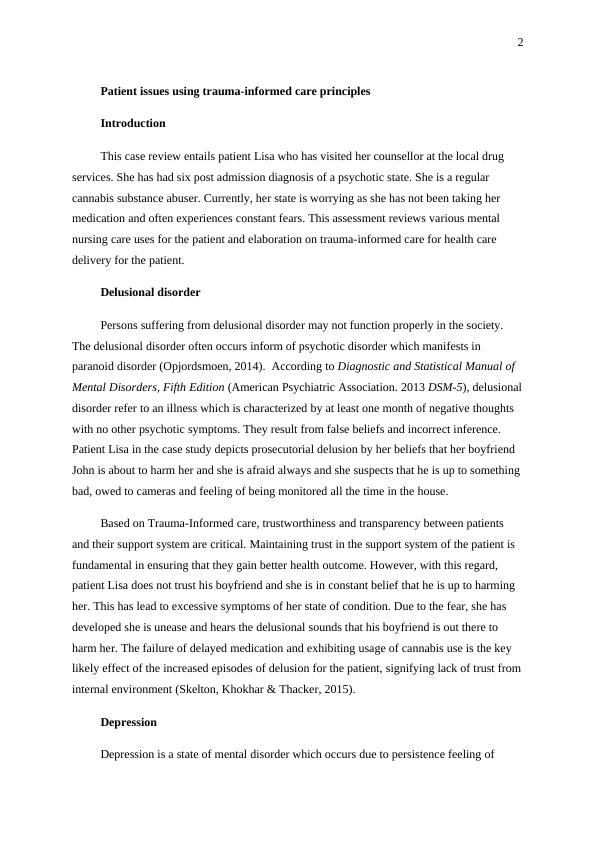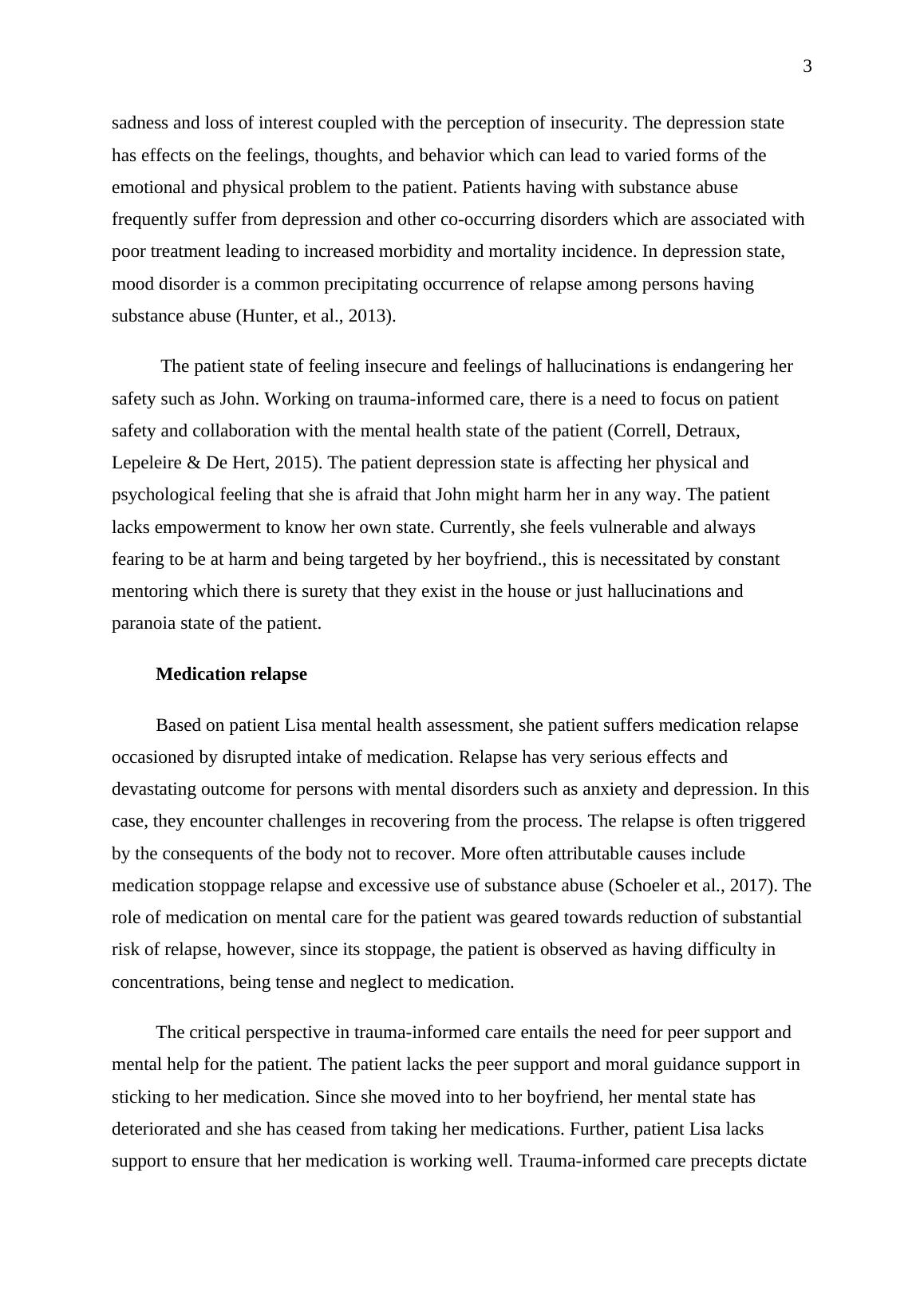Patient Lisa Mental Assessment: Trauma-Informed Care Principles
Added on 2023-01-19
8 Pages2690 Words33 Views
Case Study Review
Patient Lisa Mental Assesment
University
Unit
Name
Tutor
Date
Patient Lisa Mental Assesment
University
Unit
Name
Tutor
Date

2
Patient issues using trauma-informed care principles
Introduction
This case review entails patient Lisa who has visited her counsellor at the local drug
services. She has had six post admission diagnosis of a psychotic state. She is a regular
cannabis substance abuser. Currently, her state is worrying as she has not been taking her
medication and often experiences constant fears. This assessment reviews various mental
nursing care uses for the patient and elaboration on trauma-informed care for health care
delivery for the patient.
Delusional disorder
Persons suffering from delusional disorder may not function properly in the society.
The delusional disorder often occurs inform of psychotic disorder which manifests in
paranoid disorder (Opjordsmoen, 2014). According to Diagnostic and Statistical Manual of
Mental Disorders, Fifth Edition (American Psychiatric Association. 2013 DSM-5), delusional
disorder refer to an illness which is characterized by at least one month of negative thoughts
with no other psychotic symptoms. They result from false beliefs and incorrect inference.
Patient Lisa in the case study depicts prosecutorial delusion by her beliefs that her boyfriend
John is about to harm her and she is afraid always and she suspects that he is up to something
bad, owed to cameras and feeling of being monitored all the time in the house.
Based on Trauma-Informed care, trustworthiness and transparency between patients
and their support system are critical. Maintaining trust in the support system of the patient is
fundamental in ensuring that they gain better health outcome. However, with this regard,
patient Lisa does not trust his boyfriend and she is in constant belief that he is up to harming
her. This has lead to excessive symptoms of her state of condition. Due to the fear, she has
developed she is unease and hears the delusional sounds that his boyfriend is out there to
harm her. The failure of delayed medication and exhibiting usage of cannabis use is the key
likely effect of the increased episodes of delusion for the patient, signifying lack of trust from
internal environment (Skelton, Khokhar & Thacker, 2015).
Depression
Depression is a state of mental disorder which occurs due to persistence feeling of
Patient issues using trauma-informed care principles
Introduction
This case review entails patient Lisa who has visited her counsellor at the local drug
services. She has had six post admission diagnosis of a psychotic state. She is a regular
cannabis substance abuser. Currently, her state is worrying as she has not been taking her
medication and often experiences constant fears. This assessment reviews various mental
nursing care uses for the patient and elaboration on trauma-informed care for health care
delivery for the patient.
Delusional disorder
Persons suffering from delusional disorder may not function properly in the society.
The delusional disorder often occurs inform of psychotic disorder which manifests in
paranoid disorder (Opjordsmoen, 2014). According to Diagnostic and Statistical Manual of
Mental Disorders, Fifth Edition (American Psychiatric Association. 2013 DSM-5), delusional
disorder refer to an illness which is characterized by at least one month of negative thoughts
with no other psychotic symptoms. They result from false beliefs and incorrect inference.
Patient Lisa in the case study depicts prosecutorial delusion by her beliefs that her boyfriend
John is about to harm her and she is afraid always and she suspects that he is up to something
bad, owed to cameras and feeling of being monitored all the time in the house.
Based on Trauma-Informed care, trustworthiness and transparency between patients
and their support system are critical. Maintaining trust in the support system of the patient is
fundamental in ensuring that they gain better health outcome. However, with this regard,
patient Lisa does not trust his boyfriend and she is in constant belief that he is up to harming
her. This has lead to excessive symptoms of her state of condition. Due to the fear, she has
developed she is unease and hears the delusional sounds that his boyfriend is out there to
harm her. The failure of delayed medication and exhibiting usage of cannabis use is the key
likely effect of the increased episodes of delusion for the patient, signifying lack of trust from
internal environment (Skelton, Khokhar & Thacker, 2015).
Depression
Depression is a state of mental disorder which occurs due to persistence feeling of

3
sadness and loss of interest coupled with the perception of insecurity. The depression state
has effects on the feelings, thoughts, and behavior which can lead to varied forms of the
emotional and physical problem to the patient. Patients having with substance abuse
frequently suffer from depression and other co-occurring disorders which are associated with
poor treatment leading to increased morbidity and mortality incidence. In depression state,
mood disorder is a common precipitating occurrence of relapse among persons having
substance abuse (Hunter, et al., 2013).
The patient state of feeling insecure and feelings of hallucinations is endangering her
safety such as John. Working on trauma-informed care, there is a need to focus on patient
safety and collaboration with the mental health state of the patient (Correll, Detraux,
Lepeleire & De Hert, 2015). The patient depression state is affecting her physical and
psychological feeling that she is afraid that John might harm her in any way. The patient
lacks empowerment to know her own state. Currently, she feels vulnerable and always
fearing to be at harm and being targeted by her boyfriend., this is necessitated by constant
mentoring which there is surety that they exist in the house or just hallucinations and
paranoia state of the patient.
Medication relapse
Based on patient Lisa mental health assessment, she patient suffers medication relapse
occasioned by disrupted intake of medication. Relapse has very serious effects and
devastating outcome for persons with mental disorders such as anxiety and depression. In this
case, they encounter challenges in recovering from the process. The relapse is often triggered
by the consequents of the body not to recover. More often attributable causes include
medication stoppage relapse and excessive use of substance abuse (Schoeler et al., 2017). The
role of medication on mental care for the patient was geared towards reduction of substantial
risk of relapse, however, since its stoppage, the patient is observed as having difficulty in
concentrations, being tense and neglect to medication.
The critical perspective in trauma-informed care entails the need for peer support and
mental help for the patient. The patient lacks the peer support and moral guidance support in
sticking to her medication. Since she moved into to her boyfriend, her mental state has
deteriorated and she has ceased from taking her medications. Further, patient Lisa lacks
support to ensure that her medication is working well. Trauma-informed care precepts dictate
sadness and loss of interest coupled with the perception of insecurity. The depression state
has effects on the feelings, thoughts, and behavior which can lead to varied forms of the
emotional and physical problem to the patient. Patients having with substance abuse
frequently suffer from depression and other co-occurring disorders which are associated with
poor treatment leading to increased morbidity and mortality incidence. In depression state,
mood disorder is a common precipitating occurrence of relapse among persons having
substance abuse (Hunter, et al., 2013).
The patient state of feeling insecure and feelings of hallucinations is endangering her
safety such as John. Working on trauma-informed care, there is a need to focus on patient
safety and collaboration with the mental health state of the patient (Correll, Detraux,
Lepeleire & De Hert, 2015). The patient depression state is affecting her physical and
psychological feeling that she is afraid that John might harm her in any way. The patient
lacks empowerment to know her own state. Currently, she feels vulnerable and always
fearing to be at harm and being targeted by her boyfriend., this is necessitated by constant
mentoring which there is surety that they exist in the house or just hallucinations and
paranoia state of the patient.
Medication relapse
Based on patient Lisa mental health assessment, she patient suffers medication relapse
occasioned by disrupted intake of medication. Relapse has very serious effects and
devastating outcome for persons with mental disorders such as anxiety and depression. In this
case, they encounter challenges in recovering from the process. The relapse is often triggered
by the consequents of the body not to recover. More often attributable causes include
medication stoppage relapse and excessive use of substance abuse (Schoeler et al., 2017). The
role of medication on mental care for the patient was geared towards reduction of substantial
risk of relapse, however, since its stoppage, the patient is observed as having difficulty in
concentrations, being tense and neglect to medication.
The critical perspective in trauma-informed care entails the need for peer support and
mental help for the patient. The patient lacks the peer support and moral guidance support in
sticking to her medication. Since she moved into to her boyfriend, her mental state has
deteriorated and she has ceased from taking her medications. Further, patient Lisa lacks
support to ensure that her medication is working well. Trauma-informed care precepts dictate

End of preview
Want to access all the pages? Upload your documents or become a member.
Related Documents
Complex Trauma: Understanding and Treatmentlg...
|6
|3092
|36
Identification of Issues in Lisa's Substance Abuse - Case Studylg...
|5
|810
|89
Principles of Nursing: Mental Healthlg...
|10
|2367
|465
Complex Traumas and Trauma-Informed Care Principles and Practiceslg...
|9
|3028
|69
Trauma Informed Care Practicelg...
|14
|4067
|54
Case Study Analysis: Identification of Issues and Recovery Process Using Trauma-Informed Care Principleslg...
|9
|2498
|194
